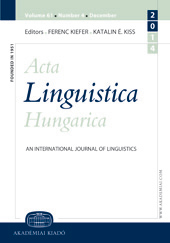Derivational resources in P’urhepecha: Morphological complexity and verb formation
Derivational resources in P’urhepecha: Morphological complexity and verb formation
Author(s): Martha MendozaSubject(s): Morphology
Published by: Akadémiai Kiadó
Keywords: P’urhepecha; morphology; derivational suffixes; verb morphology; Mexican indigenous languages;
Summary/Abstract: This article explores the derivational morphology of P’urhepecha, especially with regard to verbal forms. P’urhepecha, or Tarascan, is an isolated Mesoamerican Ianguage of Central-Western Mexico, with about 200,000 speakers. An agglutinative type of language where suffixes are attached to the stem in a fairly regular fashion, P’urhepecha also has an extensive inflectional morphology with a system of cases, including genitive, locative, and residential. The present work presents an overall picture of the linguistic complexity of this intriguing language and its rich morphological resources through a review of some of the most common and productive types of derivational morphemes that occur as part of the verbal complex in P’urhepecha, including body-part suffixes, causatives, deictic suffixes, and other adverbial suffixes.
Journal: Acta Linguistica Hungarica (Since 2017 Acta Linguistica Academica)
- Issue Year: 54/2007
- Issue No: 2
- Page Range: 157-172
- Page Count: 16
- Language: English

